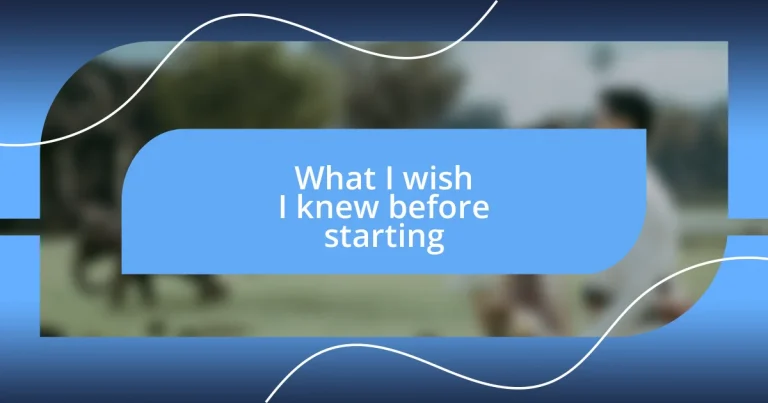Key takeaways:
- Beginner mistakes include rushing into projects without a plan, fearing to ask questions, and underestimating the importance of patience.
- Identifying necessary skills and setting realistic expectations early on can significantly enhance your chances of success in any venture.
- Continuous evaluation and adaptability are crucial for growth; seeking mentorship and support can provide invaluable guidance during challenges.
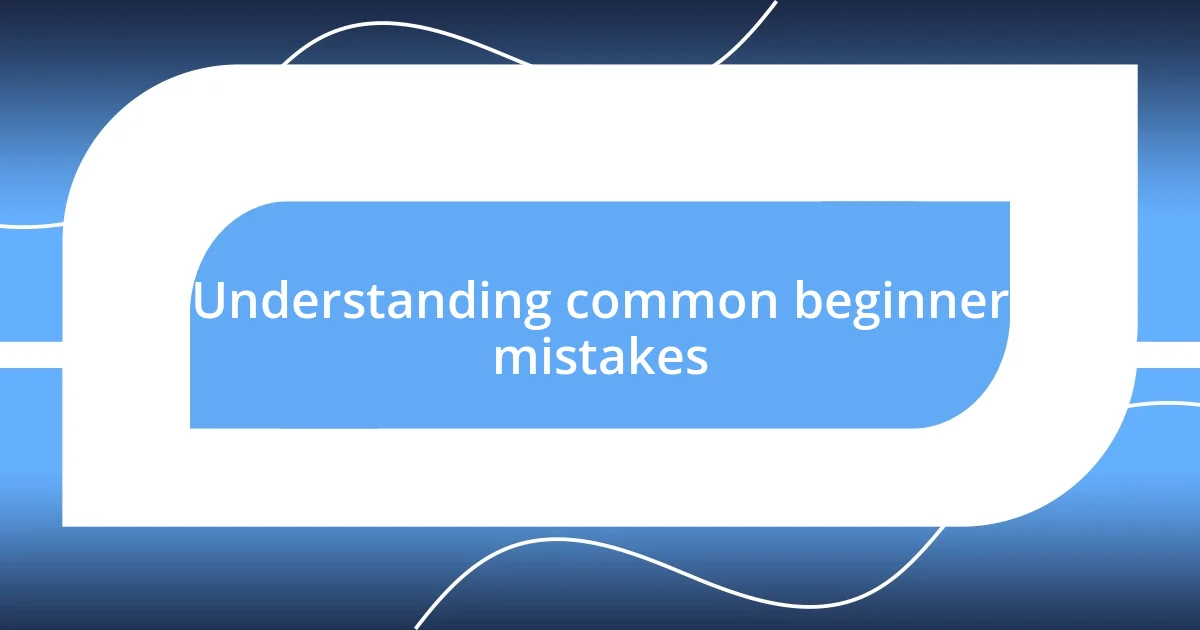
Understanding common beginner mistakes
One common mistake I see beginners make is rushing into projects without a solid plan. I remember my early days when I started a garden, throwing seeds into the ground without considering the sunlight or soil quality. The result? A patch of chaos instead of the flourishing oasis I envisioned. Isn’t it frustrating to put in effort and see little return because of a lack of foresight?
Another prevalent error is the fear of asking questions. I learned this the hard way when, in my first cooking class, I hesitated to clarify a technique. Instead of experimenting and potentially failing, I watched others confidently grill their chicken while I stood there, baffled. Why is it so easy to think we should know everything right off the bat? Embracing the learning process is vital, and it starts with open communication.
Lastly, many beginners underestimate the value of patience. I recall launching my first blog and expecting instant traffic and engagement. It was disheartening to see only a handful of views at first, but with persistence and consistent content, I gradually built a community. Have you ever felt disheartened by slow progress? Trust me, success takes time, so don’t let those initial setbacks discourage you.
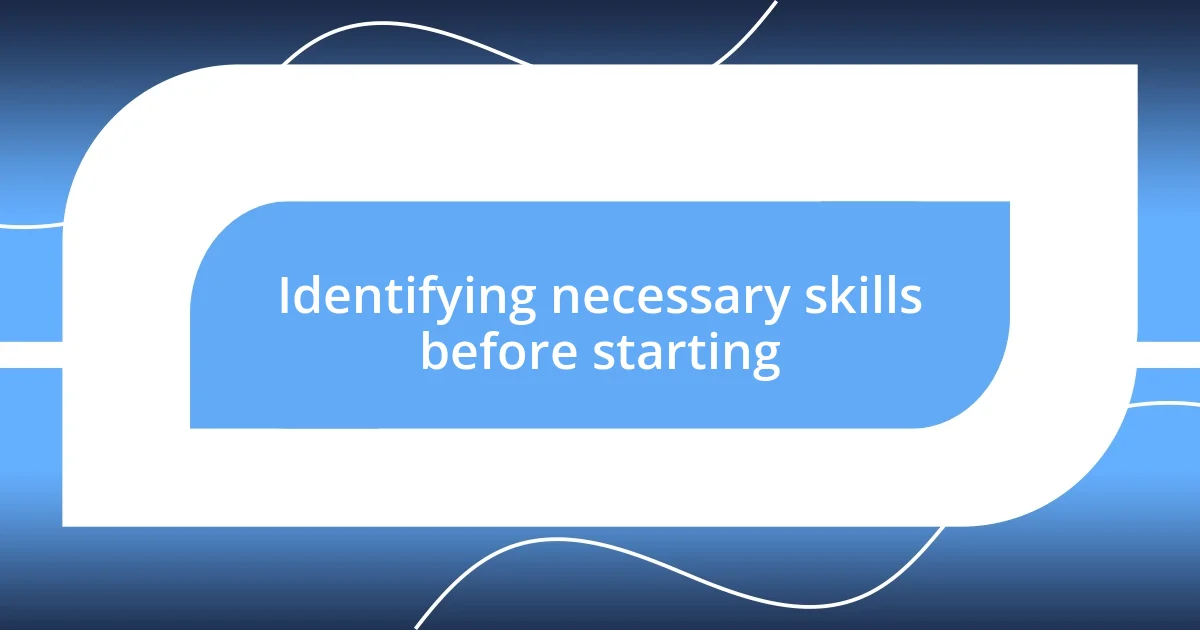
Identifying necessary skills before starting
When embarking on a new venture, recognizing the skills you’ll need is crucial. Reflecting on my journey, I remember the time I started a photography business without really understanding technical skills like lighting and composition. I thought I could rely on my passion alone, but soon realized that without the foundational techniques, my photos didn’t match my vision. It was a hard lesson that reinforced the idea that specific skills are often the backbone of success.
To help you gauge what skills might be necessary before diving in, consider the following:
- Technical Skills: Identify any software or tools you’ll need to master. For example, if you’re starting a blog, familiarity with content management systems is essential.
- Interpersonal Skills: Effective communication is key. I saw how building rapport with clients transformed my projects from mundane to meaningful.
- Time Management: Understanding how to prioritize your tasks can save you immense stress in the long run. I’ve learned this after juggling multiple projects and nearly feeling overwhelmed.
- Problem-Solving Abilities: Being able to think on your feet can turn obstacles into opportunities. I often found that my best work surfaced when I had to adapt quickly to changes.
- Research Skills: Knowing how to gather information can set you apart in any field. In my early stages, diving into market research helped me shape my approach more effectively.
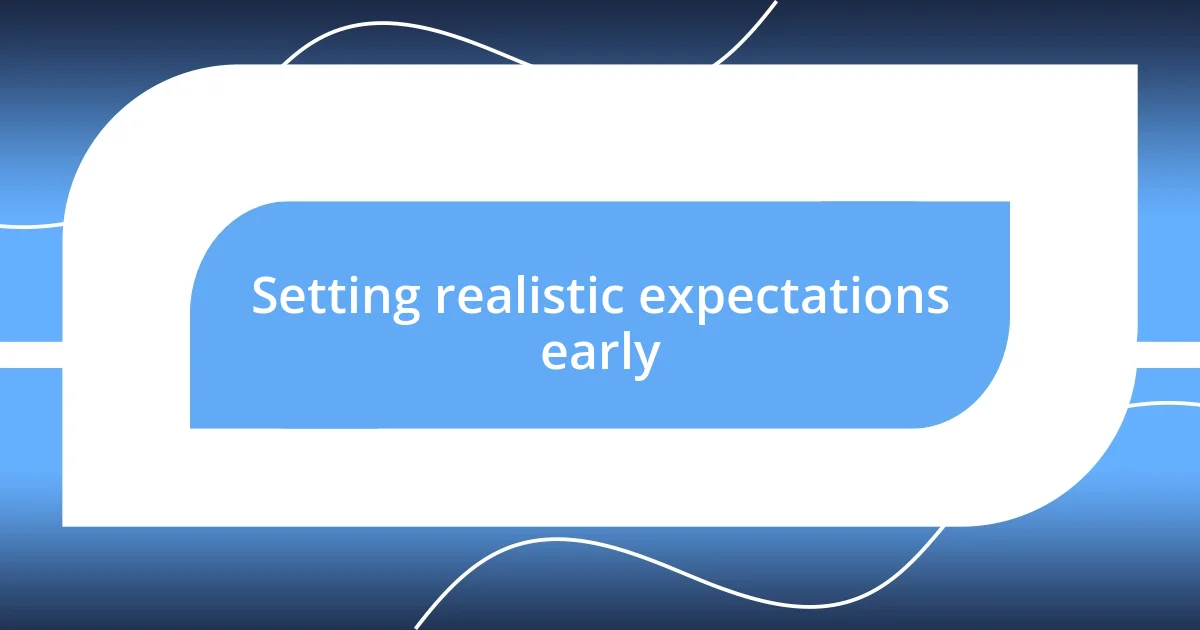
Setting realistic expectations early
Setting realistic expectations is pivotal when you’re about to step into something new. I recall deciding to learn guitar, and naturally, I believed I’d be shredding like a rock star within weeks. The reality? My fingers felt like they were made of jelly, and my progress was painstakingly slow. This experience taught me that expecting immediate mastery can lead to frustration. Instead, embracing gradual improvement and celebrating small wins made the journey much more enjoyable.
One key to setting realistic expectations is understanding that challenges will arise, and that’s perfectly normal. I remember my first attempt at baking a soufflé. Instead of a fluffy masterpiece, I ended up with a flat disappointment. While it was disheartening, it opened my eyes to the fact that every setback is just part of the learning curve. So, ask yourself: how do you respond to challenges? Knowing you’re in a process of growth can profoundly change your perspective.
It’s also important to recognize the time you can devote to learning or working on a project. I once jumped headfirst into a side business without considering my full-time job obligations. The result? Burnout. It was a tough realization that balancing responsibilities requires honest self-assessment of your limits. Understanding your availability can help you pace yourself and avoid overwhelming stress, leading to a more sustainable and fulfilling experience.
| Realistic Expectations | Unrealistic Expectations |
|---|---|
| Anticipate gradual progress. | Expect instant results. |
| Welcome challenges as learning opportunities. | View challenges as failures. |
| Assess personal time commitments. | Ignore real-life obligations. |
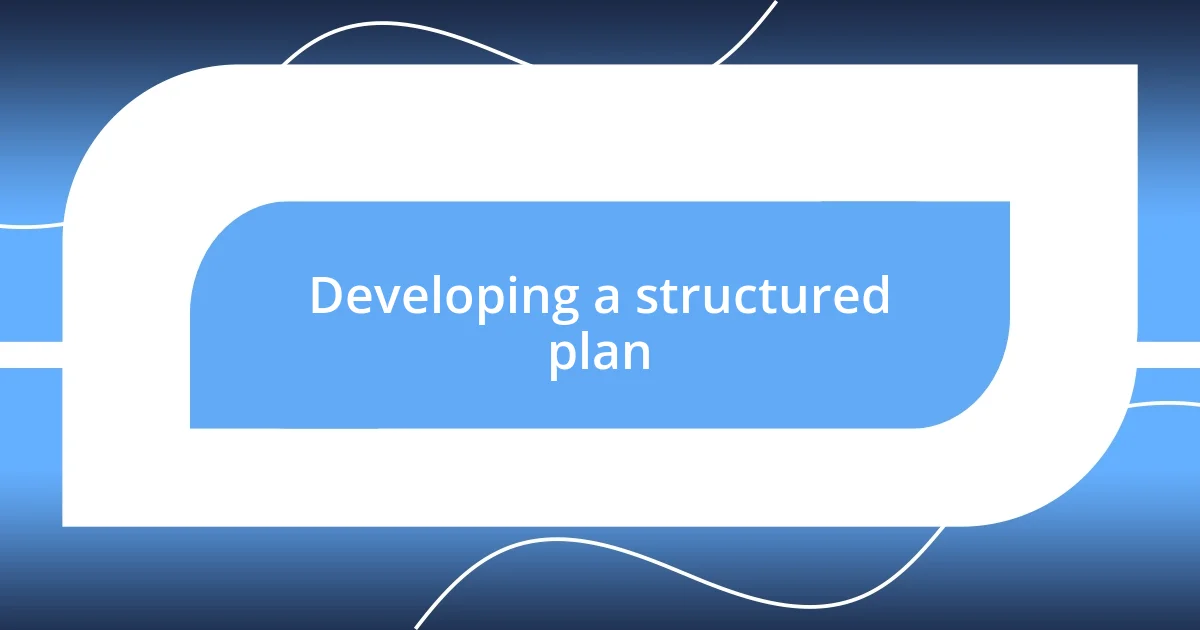
Developing a structured plan
Creating a structured plan feels like having a roadmap for your journey. When I first ventured into starting my own online store, I got swept up in excitement and began without a clear outline. It wasn’t until I found myself overwhelmed with tasks that I realized how essential it is to break your goals down into actionable steps. Did I get sidetracked? Absolutely! But once I established a comprehensive plan, everything felt more directed and achievable.
Visualizing your plan can significantly impact your progress. I still recall using a simple whiteboard to sketch out my business model and timelines. Not only did it keep me organized, but it also served as a constant reminder of my objectives. Have you ever felt the weight of ambiguity? That’s exactly what happened to me before I laid it all out. By seeing everything in one place, it transformed chaos into clarity, and my motivation soared.
Moreover, flexibility is key in your structured plan. Life is unpredictable, and I learned this the hard way when a supplier issue derailed my timeline. Instead of feeling defeated, I had to quickly adapt and adjust my plan. It’s important to incorporate checkpoints for review and revision. Are you prepared to pivot when necessary? I think embracing this mindset allows for resilience and growth, turning obstacles into stepping stones for success.
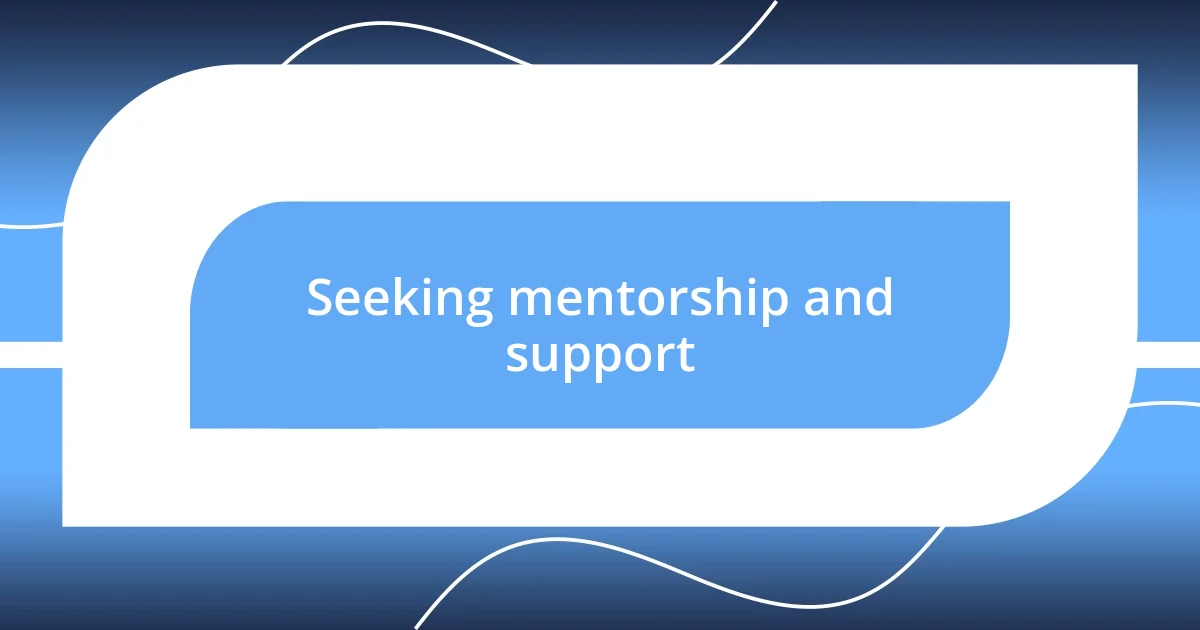
Seeking mentorship and support
Reaching out for mentorship can be a game changer in your journey. I vividly remember the first time I talked to someone who had traveled the path I wanted to take. It was like flipping a switch. Their experiences illuminated areas I hadn’t even considered, transforming my naïve enthusiasm into informed passion. Have you ever felt lost and unsure? That’s exactly how I felt before seeking advice; those candid conversations provided clarity and direction that I desperately needed.
Finding the right support network is equally vital. I once joined a local entrepreneur group, hoping to connect with others who shared similar ambitions. The camaraderie was uplifting, and exchanging ideas fueled my motivation in ways I hadn’t anticipated. Plus, celebrating others’ successes reminded me that growth is not just a solitary journey. Are you surrounding yourself with people who inspire and challenge you? I know I am, and it makes a considerable difference.
Don’t shy away from asking for help—it’s a sign of strength, not weakness. I recall a time when I hit a roadblock in my project and felt overwhelmed. Instead of pushing through alone, I reached out to a mentor, who offered invaluable insights and, honestly, a fresh perspective. That experience taught me that vulnerability can lead to profound growth. Have you ever hesitated to ask for assistance because you thought you should manage it all? Trust me, embracing support can open doors you didn’t even know existed.
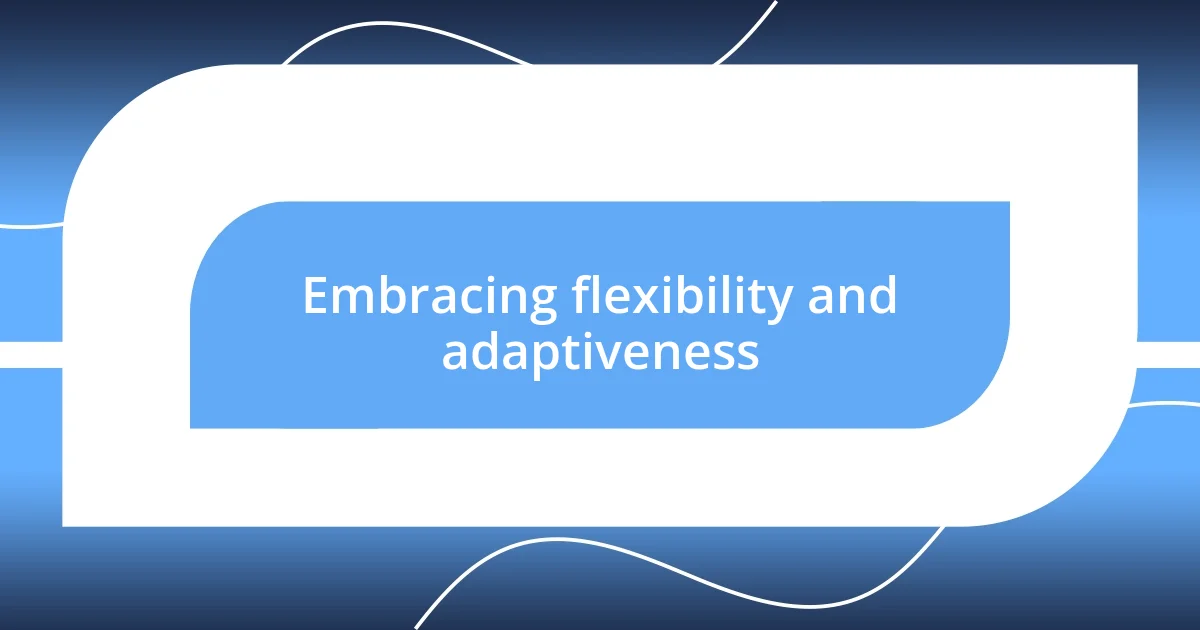
Embracing flexibility and adaptiveness
Embracing flexibility and adaptiveness can truly redefine your journey. I remember a specific moment when I launched a promotional campaign, only to realize mid-week that it wasn’t resonating with my audience at all. Instead of sticking to my original plan, I quickly pivoted my messaging and adjusted the visuals. In the end, that adaptable approach not only salvaged the campaign but also taught me a valuable lesson about listening to feedback and being open to change. Have you ever felt that sinking feeling when your plans start to falter? Just remember, it’s in those moments that adaptability becomes your greatest ally.
The ability to adjust is not just about your strategies; it’s also about your mindset. Early in my entrepreneurial journey, I tended to fixate on specific outcomes, often leading to disappointment when things didn’t go as expected. Reflecting on it now, I realize how liberating it was to shift to a growth mindset. It wasn’t about the destination at all; it was about learning from every misstep and improvising as I went along. I like to ask myself, “What unexpected lessons can this teach me?” That perspective turned challenges into opportunities, reshaping how I approached not just my business but life, too.
Adapting to change can feel daunting, but it also opens up unforeseen possibilities. For instance, when I faced an unexpected delay in shipping, I used that time to dive deeper into digital marketing strategies. What started as a setback became a chance for growth that I hadn’t anticipated. I found new ways to engage my customers and even launched a successful email campaign. Have you considered how a setback might lead you to discover something entirely new? Embracing flexibility truly has the power to transform obstacles into stepping stones.
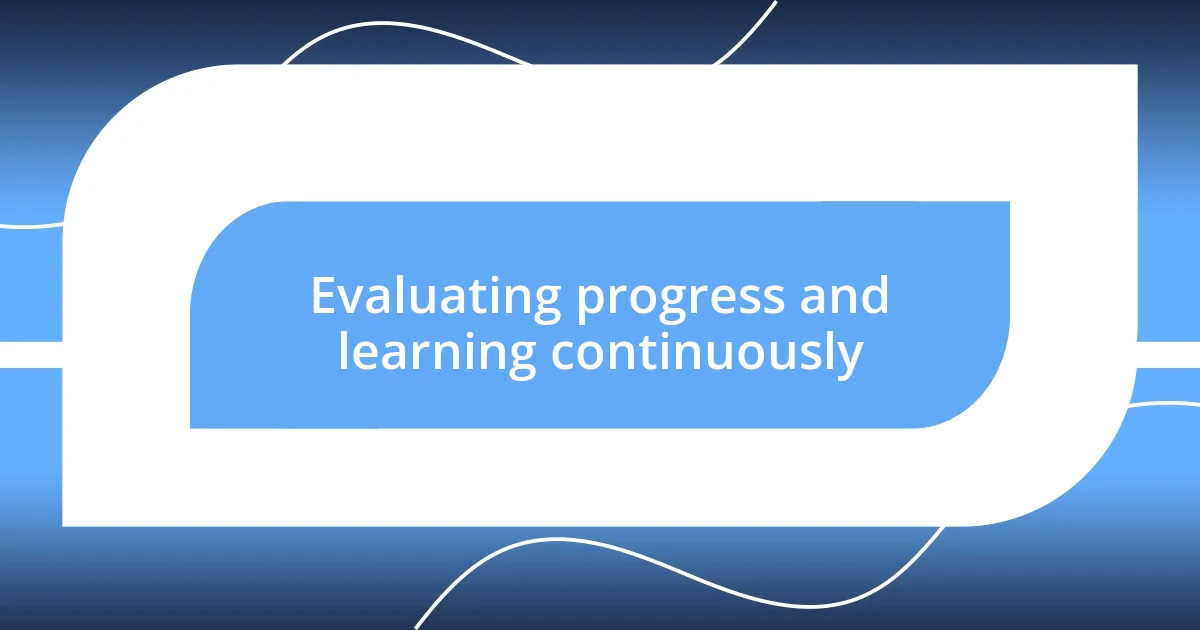
Evaluating progress and learning continuously
Evaluating your progress continuously is essential. During my early days in business, I used to check in on my goals only at the end of the month, but I quickly realized that wasn’t enough. One time, I hit a major milestone only to discover I had strayed from my initial vision. That was when I started doing weekly reflections, and it transformed my perspective. How often do you take time to assess what’s working and what’s not?
I’ve learned that learning isn’t just about accumulating knowledge; it’s about integrating feedback into your process. I remember launching a product and receiving mixed reviews. At first, it felt disheartening, but I chose to view it as an opportunity. I gathered insights from customers and made adjustments that not only improved the product but also fostered a deeper connection with my audience. Have you ever thought about how feedback can actually be a gift?
Progress evaluation should also feel lightweight and intuitive. I found that keeping a simple progress journal allowed me to catalog thoughts, stumbling blocks, and wins without the pressure of over-analyzing every detail. This ongoing dialogue with myself empowered me to celebrate small victories and address challenges as they arose, rather than waiting for the dreaded “big reveal.” How can you make your growth journey more transparent and enjoyable?












